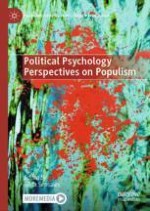2024 | OriginalPaper | Buchkapitel
5. Conspiracy Ideation and Populism
verfasst von : Valerio Pellegrini, Mauro Giacomantonio, Luigi Leone
Erschienen in: Political Psychology Perspectives on Populism
Verlag: Springer Nature Switzerland
Aktivieren Sie unsere intelligente Suche, um passende Fachinhalte oder Patente zu finden.
Wählen Sie Textabschnitte aus um mit Künstlicher Intelligenz passenden Patente zu finden. powered by
Markieren Sie Textabschnitte, um KI-gestützt weitere passende Inhalte zu finden. powered by
